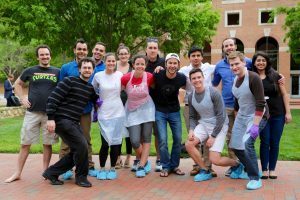News & Stories
Trash or treasure? MBAs dig in to find answers

MBA students participate in the Net Impact Club’s trash audit
The waste generated in the trash bins of our homes, offices, schools, malls and colleges has been the subject of repeated debate and discussion across forums for years. With volumes of waste filling up our landfills every day, non-governmental organizations (NGOs) and volunteer groups have issued numerous calls to action to cut down on disposed wastes.
The UNC Kenan-Flagler MBA Net Impact Club visited our local landfill in Orange County, North Carolina, as part of an effort to raise awareness about this issue. During our visit, we witnessed the problems caused by overflowing landfills and learned about potential solutions.
“It was fascinating to learn about the many ways we can improve our waste management practices,” says Travis Cooke (MBA ’17), who led our contingent’s visit. “There is immense opportunity to repurpose wastes in a way that is good for both business and the environment.”
So what’s the missing piece of the puzzle? Waste segregation.
The practice of segregating wastes has been gaining popularity, but there seems to be an inertia associated with changing daily habits for many people.

Interlocking trash sorters make recycling easier.
The concept is simple: different kinds of wastes – such as food, plastics, sanitary wastes, glass and scrap metal – have different recyclable potential and are processed in different ways. In order to facilitate these varied processes, segregating waste material is a crucial first step. Evidently, the part of the waste-to-value chain where segregation is best achieved is at the very point where waste is generated: our trash bins.
In many public places – including UNC’s campus – the practice of providing multiple trash cans designated for a particular type of waste, combined with efforts to enforce awareness and behavioral change, has begun to bear fruit.
The numbers have been encouraging, but there is still a long way to go. According to Statista, the percentage of total wastes segregated and recycled across the U.S. rose sharply until 2000 but has been flat ever since. Any and all efforts to pick up the lost momentum and rejuvenate waste management efforts are clearly needed.

Results of the 2016 MBA Net Impact trash audit
During an innovative behavioral change campaign, the UNC Kenan-Flagler Net Impact Club challenged our MBA classmates to participate in a trash audit. We sifted through and segregated one day’s worth of trash generated by students, faculty and staff in the McColl building, achieving a 56 percent reduction in landfill waste.
“Our initial hope with the audit was to get students thinking about small steps they could take to become more sustainable,” says Evan Fairmont (MBA ’17), vice president of sustainability for UNC Kenan-Flagler’s MBA Net Impact Club. “The results were astonishing and highlighted the need for clearer signage across the building. As a result, students are working with building staff to take concrete steps to reduce the amount of non-trash items going to the landfill.”
As we discovered, there’s treasure hidden in trash – for those that want to find it, that is!
By Prerana Manvi (MBA ’17), UNC Kenan-Flagler MBA Net Impact president, and Evan Fairmont (MBA ’17), MBA Net Impact vice president for sustainability